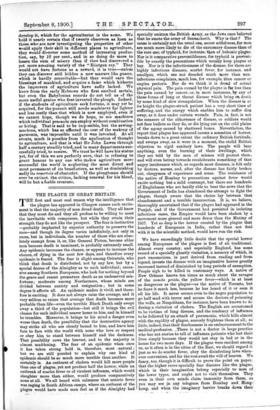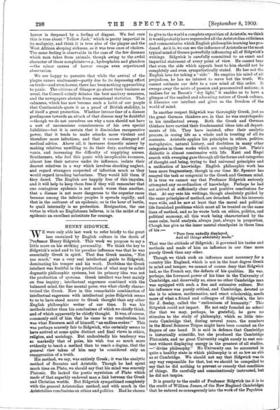THE PLAGUE IN GREAT BRITAIN.
THB first and most real reason why the intelligence that the plague has appeared in Glasgow causes such excite- ment is that the majority of men dread death. They all know that they must die and they all profess to be willing to meet the inevitable with composure, but while they retain their strength they do not like the prospect. The fear is instinctive —probably implanted by superior authority to preserve the race—and though its degree varies indefinitely, not only in races, but in individuals, the number of those who are abso- lutely exempt from it, or, like General Picton, become abler men because death is imminent, is probably extremely small. Any epidemic increases the chance, or appears to increase the chance, of dying in the next few days, and therefore 'every epidemic is feared. The fear is slight among Orientals, who think that death is distributed, not by any law, but by a special decree of the Almighty as to each individual ; exces- sive among Southern Europeans, who look for nothing beyond the grave and resent premature death as an undeserved mis- fortune; moderate among Northerners, whose minds are divided between anxiety and resignation ; but in some degree it affects all. An epidemic makes it vivid, and there- fore is exciting. It does not always raise the average, and it very seldom so raises that average that death becomes more probable than life—even the terrible Black Death only swept away a third of the population—but still it brings the evil chance for each individual nearer home to him, and in himself he trembles. Moreover, it brings to his mind a danger even worse than death, the possibility that the destructive agency may strike all who are closely bound to him, and leave him face to face with the world with none who love or respect or obey him to stand between himself and the darkness. That possibility cows the bravest, and to the majority is almost maddening. The fear of an epidemic when once it has taken strong hold is, therefore, most :natural ; but we are still puzzled to explain why one kind of epidemic should be so much more terrible than another. It certainly is. An outburst of cholera would kill more people than one of plague, yet not produce half the horror, while an outbreak of scarlet fever or of virulent influenza, which would slaughter more than either, would produce comparatively none at alL We all heard with calmness that enteric fever was raging in South African camps, where an outburst of the plague would have made men feel as if the Almighty had specially smitten the British Army, as the Jews once believed that he smote the army of Sennacherib. Why is that P The cause is certainly not the usual one, secret selfishness, for men are much more likely to die of the customary disease than of the rare o.ne, of' typhoid, for instante, than of ,bubonic plague. Nor is it comparative preventibleness, for typhoid is preVent- ible by exactly the precautions which usually keep plague at bay. Nor is it the infectiousness of the disease, for there are highly infectious diseases, scarlet fever, for instance, and smallpox, which are not dreaded much more than non• infectious complaints, much less, for example, than cancer or angina pectoris. Nor do we think it is dread of actual physical pain. The pain caused by the plague is far less than the pain caused by cancer, or, in most instances, by any of those forms of lung or throat disease which bring on death by some kind of slow strangulation. When the disease is at its height the plague-struck patient has a very short time of suffering, and the energy which enables him to suffer dies away, as it does under certain wounds. Pain, in fact, is not the measure of the abhorrence of disease, or soldiers would not face bullets as they do, or die lying out on the cold plains of the agony caused by shattered bones. Nevertheless, the report that plague has appeared causes a sensation of horror, breaks down to a great extent the ordinary British fortitude, and sweeps away, as it were in a moment, the stolid British objection to rigid sanitary laws. The people will bear anything, even the burning of their dwellings, which they are told by the men of science will protect them, and will even betray towards recalcitrants something of that angry intolerance which, as regards most diseases, is felt only by doctors, nurses, and, after the disease has fairly broken out, clergymen of experience and sense. The resistance of the native of Bombay to precautions against fever would excite nothing but a mild contempt, but there are hundreds of Englishmen who are hardly able to bear the news that the Government of India has abandoned the attempt to fight the plague, though aware that the choice lay between that abandonment and a terrible insurrection. It is, we believe, thoroughly ascertained that if the plagus had appeared in the Punjab, and if the Government had persisted in isolating infectious cases, the Empire would have been shaken by a movement more general and more fierce than the Mutiny of 1857. Yet so deep is the horror created by the plague that hundreds of Europeans in India, rather than not deal with it in the scientific method, would have run the risk.
We have exceedingly little doubt that the special horror among Europeans of the plague is first of all traditional. Almost every country, and especially England, has some record of a specially ghastly visitation, a memory of which, in part unconscious, in part derived from reading and from legend, invests the disease with an imaginative horror greatly increased instead of diminished by long periods of exemption. People sigh to be killed in customary ways. A native of New Orleans knows ten times as much about the ravages of the vomito prieto, the yellow fever—which is at least as dangerous as the plague—as the native of Toronto, but he fears it much less, because he has heard of it or seen it all his life. It never occurs even to the negro population to go half mad with terror and accuse the doctors of poisoning the wells, as Neapolitans, for instance, have been known to do during a visitation of cholera. The English are accustomed to be victims of lung disease, and the tendency of influenza to be followed by an attack of pneumonia, which kills almost with the rapidity of plague, scarcely frightens them at all; so little, indeed, that their fearlessness is an embarrassment to the medical profession. _There is not a doctor in large practice who has not stories to tell of influenza patients who lost their lives simply because they would not stay in bed or in the house for two more days. If the plague were resident among us, as it often is in the cities of the East, we should regard it just as we do scarlet fever, obey the disinfecting laws when- ever convenient, and for the rest await the will of heaven. We fancy, too, though it is difficult to prove the point on paper, that the higher races specially fear diseases likesthe plague, which in their imagination belong especially to men of the lower types, and ought not to visit themselves. They even in their own minds claim immunity from them, as you may see in any telegram from Bombay and /tong; kong, and when the imaginary barrier breaks down their
horror is deepened by a feeling of disgust. We feel sure this is true about "Yellow Jack," which is pretty impartial in its malignity, and think it is true also of the plague and the West African sleeping sickness, as it was true once of cholera. The same feeling is observable in the case of the few diseases which man takes from animals, though owing to the awful character of those complaints—e.g., hydrophobia and glanders —the minor causes of horror escape even experienced observation.
We are happy to perceive that while the arrival of the plague causes excitement—partly due to its depressing effect on trade—and even horror, there has been nothing approaching to panic. The citizens of Glasgow go about their business as usual, the Council calmly debates the best sanitary measures, and the newspapers abstain from sensational statistics. That calmness, which has now become such a habit of our people that Continentals quote it as a proof of British stolidity, is of itself a great protection. Whether intense fear of a disease predisposes towards an attack of that disease may be doubtful —though we do not ourselves see why a man should not have a sort of unconscious consciousness of his own special liabilities—but it is certain that it diminishes recuperative power, that it tends to make attacks more virulent and therefore more infectious, and that it causes disregard of medical advice. Above all, it increases domestic misery by making relatives unwilling to do their duty, scattering ser- vants, and increasing the difficulty of supplying nurses. Southerners, who feel this panic with inexplicable keenness, almost lose their natures under its influence, isolate their dearest relatives in a way which involves shocking neglect, and regard strangers suspected of infection much as they would regard invading barbarians. They would kill them if they dared. The English are happily free of this impulse, and it will help to keep them free if they will remember that one contagious epidemic is not much worse than another, that a disease is not more dangerous to the superior races because among the inferior peoples it spreads rapidly, and that in the outburst of an epidemic, as in the hour of battle, to quail internally is no protection. Resignation, the one virtue in which no Englishman believes, is in the midst of an epidemic an excellent substitute for courage.



































 Previous page
Previous page